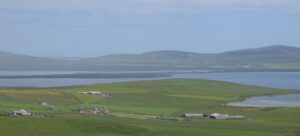
In the 1980s I went to run an excavation on the island of Rùm, one of the Inner Hebrides. Although we all knew that this was the correct name, at the time the Ordnance Survey had the island down on its maps as Rhum; anecdotally, the story was that a nineteenth century English landowner had added the ‘h’ in order to remove any ideas of an association with alcohol. So, I had a dilemma: what to call the excavation site? I’ve always thought that archaeologists are in a privileged position – few people get to decide on place names in the way that we do. The first part was easy: Kinloch, after the location. Though even that belies an Anglicization. Kinloch means ‘head of the loch’, it would commonly be used with an identifier to locate it geographically, thus: Kinloch Hourn; Kinlochleven; Kinloch Rannoch. Rightly, I guess, Kinloch on Rùm was once Kinloch Scresort. Anyway, much as I wished to use the correct, original, form of Rùm, were I to have used that, I calculated that people might well have problems finding my site on a map. So, you will find the publication under ‘Rhum: Mesolithic and Later Sites at Kinloch’.
Sadly for me, the Ordnance Survey underwent a programme to remove recent name-forms shortly afterwards and the island is now mapped as Rùm.
I’ve been interested in the use of place names ever since. I do feel that it is important to get them right. In Orkney, it is not so much the spelling of place names that people struggle with as the pronunciation. English voices tend to accentuate the last syllable of Orkney names, when in fact it is usually the earlier syllables that need emphasis here. Sadly, this means that you can often tell visiting archaeologists from their inability to pronounce some of our key sites: Stenness (there is a clue in the oft cited Stennis which we see on old maps and documents), becomes StenNESS, Stromness (StrOMnis) becomes StromNESS (or even occasionally, StrOMENESS) and so on. For those who intend to work here I’d suggest that it is worth practicing the correct pronunciation. That way we look less like an invading force. And just to keep you on your toes, Longhope is exactly that: LongHOPE, the exception that proves the rule.
It is the same in publications: we should try to spell the sites and places right. Recently, in academic papers, I’ve seen ‘western Mainland’ (it doesn’t exist, though there is an area called West Mainland), Maes Howe (this used to be the Historic Scotland version of the local name Maeshowe, but in the last ten years or so they have switched to the Orkney spelling), and, in a popular journal, Sandy Island. The latter is an interesting mistake: presumably it results from an overzealous spell checker (suggesting perhaps that algorithms don’t always work?), though it is also worth noting that the island is in fact called Sanday, pronounced (you have guessed) Sandie. So perhaps the article was dictated.
While I’m on about this I’d also note that Orkney is Orkney, never The Orkneys (we hate that), nor The Orkney Isles (though the Council confuse things by calling themselves Orkney Islands Council). We can, of course be the Orkney archipelago, the Orkney islands, or even, at a push, the Orkney isles.
OK, I’m having a pedantic spell. But, I do think it is worth learning about the places we unpick and getting them right. As someone who gets called variously Carolyn, Caroline, Carol, Christine and Catherine, even by people who have known me for years (and don’t even start on my surname), I know the value of names.
You must be logged in to post a comment.